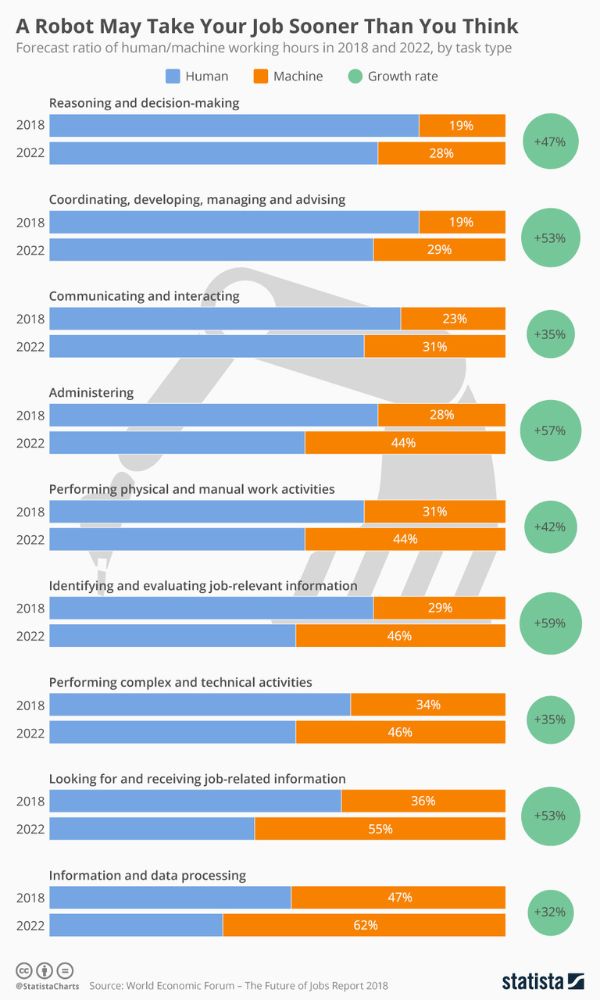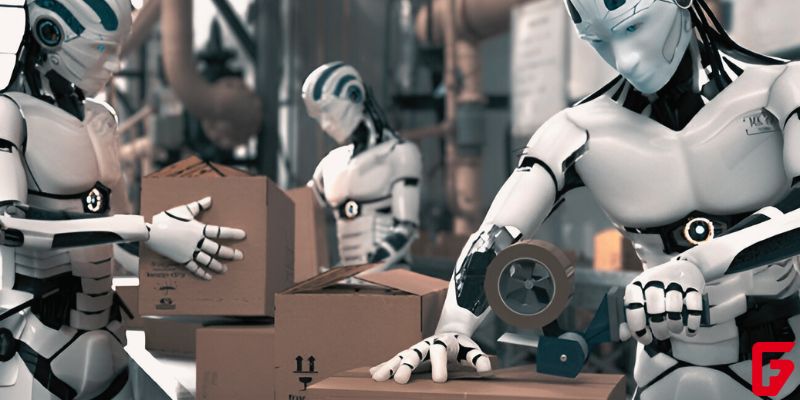In recent years, the rapid advancement of technology has brought about an increase in the use of robots and automation in the workplace. While this shift has led to increased efficiency and productivity, it has also raised concerns about its impact on the job market. Let’s explore the impact of robot automation on the job market and its potential consequences.
The use of robots in the workplace has been steadily increasing over the past few decades. According to a report by the International Federation of Robotics, the global installation of industrial robots increased by 85% between 2010 and 2019, with more than 2.4 million robots currently in operation. This trend is expected to continue, with estimates suggesting that the global market for robots will reach $135 billion by 2027.
The Impact on Employment
The rise of robot automation can be attributed to several factors, including advancements in technology, decreasing costs, and increasing demand for efficiency and productivity. Robots are now capable of performing a wide range of tasks, from assembly and packaging to welding and painting. They can work around the clock, are not subject to human error, and can perform tasks that are too dangerous or difficult for humans.
While the increased use of robots and automation has led to increased efficiency and productivity, it has also raised concerns about its impact on employment. Some experts predict that the widespread adoption of robots and automation could lead to significant job losses, particularly in industries such as manufacturing and logistics.
A report by the McKinsey Global Institute estimates that up to 800 million jobs could be displaced by automation by 2030, with the majority of job losses occurring in developing countries. The report suggests that low-skilled jobs, such as manual labor and routine tasks, are most at risk of being automated.
However, other experts argue that while certain jobs may be displaced by automation, new jobs will also be created. For example, the increased use of robots and automation may lead to an increase in the demand for workers who are skilled in areas such as robotics, programming, and maintenance.

Sarcos Technology designs, develop, and manufacture a broad range of advanced mobile robotic systems that redefine human possibilities and are designed to enable the safest, most productive workforce in the world. Sarcos robotic systems operate in challenging, unstructured, industrial environments and include teleoperated robotic systems, a powered robotic exoskeleton, and software solutions that enable task autonomy. They have solutions for aviation, construction, shipyard, solar field construction, and vegetation management.
Nuro is a robotics company that develops self-driving vehicles. The company offers autonomous, on-road vehicles designed to transport and deliver goods.
Its autonomous vehicle Nuro deploys autonomous delivery service at scale; Nuro R2 performs autonomous deliveries and trains vehicles to act as part of an unmanned fleet; Nuro P2, maps and performs autonomous deliveries with onboard safety operators.
Nuro delivers goods to communities such as Houston, Silicon Valley, and Greater Phoenix, the US. Its partners include Domino’s, Kroger, Walmart, Chipotle, FedEx, and 7-Eleven.
Skydio is the leading U.S. drone manufacturer and world leader in autonomous flight. Skydio leverages breakthrough AI to create the world’s most intelligent flying machines for use by consumers, enterprises, and government customers. Skydio is made up of leading experts in AI, robotics, cameras, and electric vehicles from top companies, research labs, and universities from around the world.
Skydio designs, assembles, and supports its products in the U.S. from its headquarters in Redwood City, CA, to offer the highest standards of supply chain and manufacturing security. Skydio is trusted by leading enterprises across a wide range of industry sectors and is backed by top investors and strategic partners including Andreesen Horowitz, Levitate Capital, Next47, IVP, Playground, and NVIDIA.
Starship Technologies is redefining the last-mile delivery industry. We build self-driving local delivery robots that are safe, reliable, clean, and cost-efficient. Starship was launched by Skype co-founders, Ahti Heinla and Janus Friis in 2014. Just a few years later, our robots are now doing thousands of deliveries a day in towns, cities, and campuses across the world.
Our business headquarters are located in San Francisco, and our main engineering office is in Estonia. Recently, we celebrated launching new cities and campuses all over the world and completing 3.5 million autonomous deliveries. Join us and take a step into the future!
Intuitive is a global technology leader in minimally invasive care and the pioneer of robotic-assisted surgery. At Intuitive, we believe that minimally invasive care is life-enhancing care. Through ingenuity and intelligent technology, we expand the potential of physicians to heal without constraints.
Intuitive brings more than two decades of leadership in robotic-assisted surgical technology and solutions to its offerings and develops, manufactures, and markets the da Vinci surgical system and the Ion endoluminal system.
We are a human-centered robotics company. Our mission is to make technical advances towards robots and humans working together side by side, with an emphasis on human-centric design. Diligent Robotics is developing a suite of artificial intelligence that enables robots to collaborate with and adapt to humans in everyday environments.
Our service robots are designed to participate and work together with teams of humans. Our first product is a hospital service robot that can assist clinical staff with logistical tasks, allowing them to spend more of their time on direct patient care, improving patient satisfaction, quality of service, and safety.
AMP Robotics is reimagining and actively modernizing the world’s recycling infrastructure by applying AI and robotics to economically recover commodities reclaimed as raw materials for the global supply chain. The AMP Cortex™ high-speed robotics system automates the identification and sorting of recyclables from mixed material streams.
The AMP Neuron™ AI platform continuously trains itself by recognizing different colors, textures, shapes, sizes, patterns, and even brand labels to identify materials and their recyclability. Neuron then guides robots to pick and place the material to be recycled.
Designed to run 24/7, all of this happens at superhuman speed with extremely high accuracy. With deployments across the United States, Canada, and Japan, and now expanding into Europe, AMP’s technology recovers recyclables from municipal waste, precious commodities from electronic waste, and high-value materials from construction and demolition debris.
Piaggio Fast Forward is a Boston-based company that creates innovative tech products for easier, smarter, and more enjoyable local living. We have a passion for living locally and aim to create innovative solutions to help people connect more and get the best out of their neighborhoods.
Our first debut, the gita robot, is a hands-free following robot that can carry 40lb of gear for up to 4 hours of active use on a single charge. It’s an emission-free alternative to urban transportation that combines the best architectural design with the most innovative computer intelligence.
RightHand Robotics is a leader in providing end-to-end solutions that reduce the cost of e-commerce order-fulfillment of electronics, apparel, grocery, pharmaceuticals, and countless other industries.
Unlike traditional factory robots that can be complex to setup and are singly purposed, RHR solutions are simple to integrate and adaptable to improve the utilization of many different customer workflows, such as sorting batch-picked items, picking items from an ASRS, inducting items to a belt sorter, and order quality assurance.
Robots have the potential to reshape our existence. Our mission is to leverage robotics to improve the universal quality of life. Robots will become one of the most impactful and effective tools humanity has ever created.
We develop humanoid robots that work alongside people.
We pursue ambitious goals to make this a reality. We’re not satisfied with making incremental improvements to the status quo but are driven to change the paradigm altogether. Our robots are versatile and capable of solving numerous tasks with a single embodiment.
Rapid’s mission is to provide manufacturers a robotic solution that can be deployed against simple tasks in hours rather than weeks, and at a fraction of the cost of other automation solutions that require extensive manual programming. Our product is a fully integrated robotic arm work cell that is trained to perform tasks out of the box, and learns new tasks via our cloud infrastructure, AI, and Computer Vision.
Rapid’s software provides our customers with an intuitive interface that gives them the tools to deploy and redeploy Rapid’s automated work cells on their manufacturing lines without having to be a robotics expert. To enable accessible and simple user-facing controls requires an extensive and specialized technology stack. Rapid’s platform is powered by AI and Computer Vision that drastically reduces the complexity, cost, and time typically required to set up a robotic arm. In short, we are automating the process of deploying manufacturing automation.
Outrider, the pioneer in autonomous yard operations for logistics hubs, helps large enterprises improve safety and increase efficiency. The only company exclusively focused on automating all aspects of yard operations, Outrider eliminates manual tasks that are hazardous and repetitive.
Outrider’s mission is to drive the rapid adoption of sustainable freight transportation by deploying zero-emission systems. Outrider is a private company backed by NEA, 8VC, Koch Disruptive Technologies, and other top-tier investors.
1X Technologies, former Halodi Robotics, is an engineering and robotics company that specializes in producing androids capable of human-like movements and behaviors.
They develop humanoid robots that can operate in a variety of environments. The company has quickly gained recognition for its innovative approach to creating robots that are both highly versatile and user-friendly.
1x’s flagship product is the EVE robot, a highly advanced humanoid robot designed to perform a wide range of tasks.
Thoughts
The impact of robot automation on the job market is not yet fully assimilated, and there are concerns about its potential consequences. One of the main consequences is the potential for increased income inequality. As low-skilled jobs are automated, there is a risk that those who are displaced will struggle to find new employment, leading to increased poverty and inequality.
The potential for social unrest is big. As more jobs are automated, there is a risk that workers will feel left behind and become disillusioned with the system. This could lead to protests, strikes, and other forms of social unrest.
Robot automation in the workplace is bringing big and significant changes to the job market, and with theses, has led to increased efficiency and productivity. As we move forward, it is important to consider the potential risks and benefits, creating a future where technology and employment can coexist harmoniously.
Source: https://www.statista.com/chart/15475/a-robot-may-take-your-job-sooner-than-you-think/

